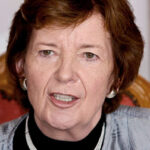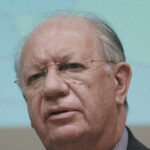President Lagos and Members Bruntland and Mogae, all UN Special Envoys on Climate Change, supported UNSG Ban Ki-Moon, in the search for a politically viable climate accord. These consultations provided clear and productive opportunities for our Members to deliver and advance the conclusions and recommendations of the GLCA Initiative. Likewise, bilateral meetings with representatives from national governments, civil society, industry and the youth, provided a unique occasion to further mobilize political will and facilitate an agreement.
Members Robinson and Brundtland, together with EC Vice-President Margot Wallström chaired the 3rd “Road to Copenhagen” (RtC) Conference which addressed key elements of the deal. Jointly organized by CdM, Globe-Europe, Respect Table and the City of Malmo, (Malmo, 8-9 Dec), the Conference gathered more than 150 participants including representatives of civil society, business and government. Member Robinson stressed the need to ensure that the climate change agreement adequately mainstreams the principles of climate justice and human rights. Member Bruntland highlighted that the costs of climate change action are huge but manageable, and significantly less than the costs of inaction. She also argued in favour of a ‘fast start’ fund to enable and encourage early mitigation and adaptation action among developing countries. The RtC conference also analyzed barriers for technology development and transfer and possible policies to overcome these. The RtC’s final recommendations were delivered to Yvo de Boer, UNFCCC’s Secretary General immediately after the meeting.
The CdM and the Eikosphere Foundation premiered the short film “Eye of the Future”(15 Dec). The event focused on cutting edge sustainability initiatives and climate solutions from around the world. Members Robinson and Figueres addressed the issue of climate justice and political leadership, respectively. President Lagos chaired the debate with representatives from business and government, focusing on the way national leaders can deliver policies needed to support the implementation of sustainable investment in clean technologies.
Together with the President of the UN Foundation Timothy Wirth, President Lagos led a very well attended side-event on “Scaling –up Low Carbon Energy Investments in Developing Countries” (Copenhagen, 16 Dec). The panel included distinguished leaders from the public and private finance sectors that discussed current low-carbon energy investment in developing countries, energy needs; investment profiles; potential for scaling up investments; present financial and regulatory barriers; policy options and innovative financial instruments to overcome barriers; and recommendations for both policy makers and private-sector investors.
President Lagos participated at numerous side-events organized within COP 15, including one by Green Cross International (Copenhagen, 16 Dec) on ‘recalibrating responses to climate change challenges in the face of growing risks to human security and development’. Recognizing the imperative of not exceeding the 2o C target and the growing threat of emerging economies’ emissions, President Lagos proposed that non-Annex I countries (developing nations) commit to reduce their national greenhouse emissions through existing Nationally Appropriate Mitigation Actions (NAMAs) and, once this is achieved, the corresponding financial resources allocated and actions initiated by a critical mass of countries, the commitments become binding for the Party in question.
Interview to Ricardo Lagos by Blogactiv



